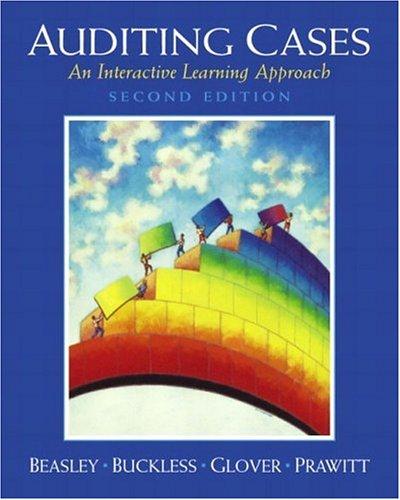Question
For this discussion we will consider the potential disciplinary sanctions that should be taken against an officer who commits legal, policy and/or ethical transgressions. Choose
For this discussion we will consider the potential disciplinary sanctions that should be taken against an officer who commits legal, policy and/or ethical transgressions. Choose oneof the following situations and explain what your rational for the administration of punishment would be, if any and what you think would be the reasonable consequences if you were the supervisor of that officer:
- An officer that works for you has a drinking or drug problem.
- An officer that works for you has taken a bribe.
- An officer that works for you has stolen an item from a crime scene.
- An officer that works for you has hit a handcuffed suspect.
- An officer that works for you has been bouncing checks for his/her bills.
- An officer that works for you has been disrespectful to a member of a minority group.
- An officer that works for you has be sexually harassing a coworker.
Your peer responses should be substantive and clear. Be sure to address their responses and your agreement or disagreement and why in TWO sentences only.
peer #1
If an officer employed under me is found to have a drinking or drug problem, the disciplinary action taken would depend on the severity of the issue. Generally, the first action would be a verbal warning followed by counseling sessions. It is essential to distinguish between having a problem with drinking and being addicted to drugs. These two issues are rated differently in terms of their severity. While both alcohol and drugs can be addictive, it's essential to know that alcohol is legal, whereas drugs are not. It is essential to initiate the process of taking action against an officer with a verbal warning. This will allow the officer to recognize their mistake and improve their behavior. After the warning, I would suggest that the officer seek counseling sessions to help them deal with the situation. Officers must seek professional counseling to address the underlying issues that could have led them to such behavior. Personal issues or other problems may contribute to such behavior. As highlighted in Chapter 7, officers may also develop drug addiction due to wrong reasons, like theft or easy accessibility. I suggest that officers with a drinking or drug problem should undergo drug tests more frequently, not just annually or quarterly. This could ensure that they are making progress in staying away from such substances. As a supervisor, it is essential to be aware of any drug or alcohol problems that an officer under my supervision may be experiencing. Failure to take action could have severe consequences for the officer and the workforce. Addressing the issue as soon as possible is crucial to prevent any further harm.
peer #2
As the police supervisor dealing with problem #1 it is very important that I take a situation like this seriously because of the way that the result could impact the public's view of the department. In this scenario I would have to choose the punishment or disciplinary action based on the multiple different situations that could be at play. In the case of alcohol it would depend on the severity of the problem. If the officer is drinking in a way that is completely excessive and is impeding his ability to do his job and starting to put a strain on his relationship with his family, I would say that he should be put on leave and given multiple different resources to utilize in order to fix his problem. If he ends up fixing the issue he could come back to the force but only after very significant improvements are seen. However, if it is only a minor drinking problem, I would say that he should not be put on leave but given different resources to access in order to make sure the problem is fixed and/or lessened all while still working as a cop. Alcohol is one thing, but drugs present an entirely different issue, as many of them are illegal and could get someone arrested by law enforcement for possessing. As a cop, high moral standards are extremely important. As the people enforcing the law they should be held to a higher standard of behavior than a normal civilian. Abusing an illegal drug would be a complete violation of this standard and not just a problem that could be solved by mere rehabilitation resources like alcohol could. For this reason I would have to dismiss an officer that had an illegal drug problem from the police force because they violated not only the law, but public trust as well.
Step by Step Solution
There are 3 Steps involved in it
Step: 1

Get Instant Access to Expert-Tailored Solutions
See step-by-step solutions with expert insights and AI powered tools for academic success
Step: 2

Step: 3

Ace Your Homework with AI
Get the answers you need in no time with our AI-driven, step-by-step assistance
Get Started


